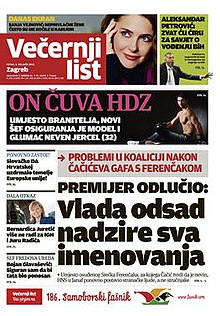Večernji list
 | |
 Front page of the 3 February 2012 issue | |
| Type | Daily newspaper |
|---|---|
| Format | Berliner |
| Owner(s) | Styria Media Group |
| Publisher | Večernji list d.d. |
| Editor-in-chief | Dražen Klarić[1] |
| Founded | 1959 |
| Political alignment | Conservatism[2] |
| Language | Croatian |
| Headquarters | Slavonska avenija |
| City | Zagreb |
| Country | Croatia |
| Circulation | 60,579 (as of October 2014) |
| ISSN | 0350-5006 |
| Website | www |
| |
Večernji list (also known as Večernjak; lit. 'evening paper') is a Croatian daily newspaper published in Zagreb.
History and profile[]
Večernji list was started in Zagreb in 1959.[3][4] Its ancestor Večernji vjesnik ("Evening Courier") appeared for the first time on 3 June 1957 in Zagreb on 24 pages[5] but quickly merged with Narodni list (meaning "People's Paper" in English) to form what is today known as Večernji list.
Večernji list is considered a conservative leaning newspaper.[2]
Editions[]
Večernji list formerly had multiple regional and two foreign editions:[6]
- Dalmatia
- Istria-Primorje-Lika
- Slavonia and Baranja
- Podravina and Bilogora
- Varaždin and Međimurje
- Zagorje
- Sisak
- Karlovac
- Zagreb
- Bosnia and Herzegovina
- International edition
In 2012, all of the Croatian regional editions were merged, so four editions remain: Zagreb, Croatia, Bosnia-Herzegovina and World.[citation needed]
Croatia to the World[]
In February 2021, Večernji list, in collaboration with the Academy of Fine Arts and the , compiled a list of the 38 Croatians (ethnically Croat or connected to Croatia)[7] who gave most to the world, influencing global history. They organized an exhibition held at the Meštrović Pavilion, entitled "Croatia to the World" (Hrvatska svijetu), including over a thousand items connected to the thirty-eight masterminds. The first twelve names were chosen in 2019, but the list was then extended to 38 greats by February 2021.[8] The list is composed of: Ivo Andrić, Giorgio Baglivi, Josip Belušić, Roger Joseph Boscovich, Ivana Brlić-Mažuranić, Ivan Česmički, Marin Getaldić, Franjo Hanaman, Jerome, Marcel Kiepach, Julije Klović, Slavko Kopač, Benedikt Kotruljević, Zinka Kunc-Milanov, Antun Lučić, Giovanni Luppis, Dora Maar, Marko Marulić, Ivan Meštrović, Andrija Mohorovičić, Franciscus Patricius, Slavoljub Eduard Penkala, Marco Polo, Herman Potočnik, Vladimir Prelog, Mario Puratić, Lavoslav Ružan, Andrea Schiavone, David Schwartz, Pope Sixtus V, Mia Slavenska, Andrija Štampar, Rudolf Steiner, Nikola Tesla, Milka Trnina, Faust Vrančić, Ivan Vučetić, and Nikola IV Zrinski.[8][9]
References[]
- ^ "Impressum" (in Croatian). Retrieved 21 March 2018.
- ^ Jump up to: a b Popović et al. 2010, p. 79.
- ^ "Croatian newspapers and magazines". PECOB. Retrieved 11 October 2013.
- ^ Helena Popović; Paško Bilić; Tomislav Jelić; Nada Švob-Đokić (October 2010). "The case of Croatia". Media policies and regulatory practices in a selected set of European countries, the EU and the Council of Europe (PDF). Athens: The Mediadem Consortium. pp. 77–104. Archived from the original (PDF) on 2 January 2015. Retrieved 2 January 2015.
- ^ "50 godina preteče Večernjaka". Večernji list (in Croatian). 2 June 2007. Archived from the original on 10 June 2007. Retrieved 21 March 2018.
- ^ "Cijene i uvjeti oglašavanja" (PDF) (in Croatian). Retrieved 29 September 2009.
- ^ Stela Lechpammer. "Na ulazu je Sunce, simbol fascinacije svemirom". Večernji list. Archived from the original on 13 February 2021. Retrieved 13 February 2021.
- ^ Jump up to: a b Stela Lechpammer. "Za let u svemir zaslužan je Puljanin, a izum Bračanina unaprijedio je ribarstvo". Večernji list. Archived from the original on 13 February 2021. Retrieved 13 February 2021.
- ^ Patricia Kiš Terbovc. "HRVATSKA SVIJETU Na izložbi i prvi ribar na svijetu, otac nadzorne kamere te izumitelj "zaslužan" za treću smjenu". Jutarnji list. Archived from the original on 13 February 2021. Retrieved 13 February 2021.
Bibliography[]
- Popović, Helena; Bilić, Paško; Jelić, Tomislav; Švob-Đokić, Nada (29 October 2010). "The case of Croatia". Media policies and regulatory practices in a selected set of European countries, the EU and the Council of Europe (PDF). Athens: The Mediadem Consortium. pp. 77–107. Archived from the original (PDF) on 2 January 2015. Retrieved 2 January 2015.
External links[]
- Official website
 (in Croatian)
(in Croatian)
- 1959 establishments in Croatia
- Daily newspapers published in Croatia
- Newspapers established in 1959
- Croatian-language newspapers
- Mass media in Zagreb
